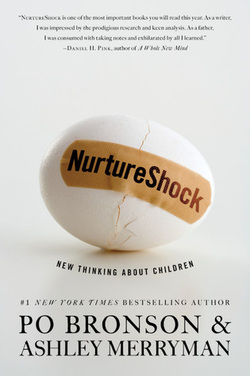
When I was in college, I started reading Carolyn's Hax's advice column in the Washington Post. I have read it fairly religiously ever since, so Hax's voice has been in my mind from my first date through my marriage. and has certainly been handy along the way. From time to time, she recommends a book, and Nurture Shock by Po Bronson and Ashley Merryman is one of the most highly recommended books from the site.
Nurture Shock is a compilation of research into child development and is touted to revolutionize the way we think of kids brains and explain why so many well meaning parenting techniques fail.
So there are two reasons you should not trust my review of this book. #1 - as a devoted advice column reader, I know that people without kids (aka me) should never ever give parenting advice. I read this book because I think brains are interesting, not because I have a live experiment to test it out on. #2 - the book itself refers to outdated science based books about child development with a certain degree of scorn and total lack of self awareness that the science in this book will likely eventually be debunked or at least refined.
That said, I found it really interesting and 40% of the "pages" in my kindle version are references to scientific studies, so they certainly did their homework. Here are some tidbits to whet your appetite.
Long Story Short: Fascinating book, well written, well worth the read if you ever plan on knowing a child.
Nurture Shock is a compilation of research into child development and is touted to revolutionize the way we think of kids brains and explain why so many well meaning parenting techniques fail.
So there are two reasons you should not trust my review of this book. #1 - as a devoted advice column reader, I know that people without kids (aka me) should never ever give parenting advice. I read this book because I think brains are interesting, not because I have a live experiment to test it out on. #2 - the book itself refers to outdated science based books about child development with a certain degree of scorn and total lack of self awareness that the science in this book will likely eventually be debunked or at least refined.
That said, I found it really interesting and 40% of the "pages" in my kindle version are references to scientific studies, so they certainly did their homework. Here are some tidbits to whet your appetite.
- Praising kids for being smart actually backfires and makes them perfectionists afraid to fail. Praising kids for working hard makes them work harder and actually be smarter.
- There is a period of sleep state where people translate their daily experiences into memory/knowledge. For adults, it lasts something like 3 minutes an hour. For kids, its more like 40 minutes. So sleep deprivation for kids has a huge effect on lots of different things. One particularly interesting study was on the effect of SAT scores on a high school when the start time of the school was changed to an hour later in the day. Huge.
- Not specifically talking about race with a child in a multicultural environment, does not prevent the child from including skin color in their categorizations of the world. It actually makes them more likely to choose friends of the same skin color as kids pick the people most like them. But if you wait until the child is old enough to ask about it himself, it is too late to drastically alter their behaviors (in terms of grade school friend choice).
- All kids lie. In fact, successful lying is a sign of intelligence. But by the time a child is a teenager, they are likely to be pretty good at it. At that point, arguing a lot with parents is actually a sign of respect.Even among "good kids" (high achievers) the more kids argued and negotiated with their parents, the more they respected them. The kids who didn't respect their parents just lied. But the parents of the arguers thought they had a bad relationship with their kids, and the parents of the liars though their relationship was great!
Long Story Short: Fascinating book, well written, well worth the read if you ever plan on knowing a child.
 RSS Feed
RSS Feed